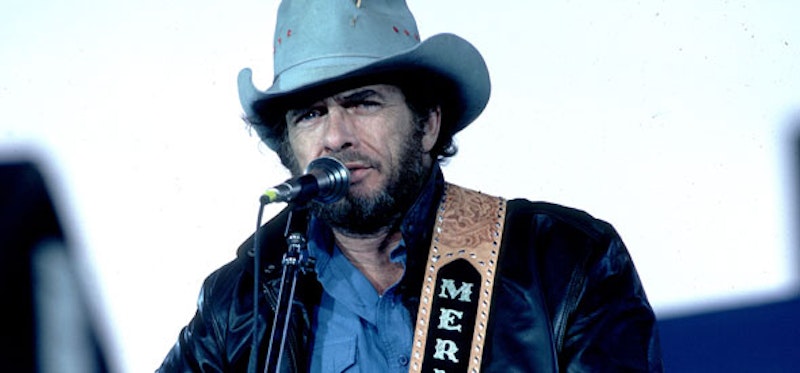When Merle Haggard wrote one of his most famous songs, “Okie from Muskogee,” he probably didn’t know the extent to which it would define his career. At the time, Haggard was in the middle of a remarkable creative period, putting out a hit single every four months from 1967 to 1970: The Running Kind, David Cantwell’s 2013 book on Haggard, suggests that at the end of the 60s, only James Brown rivaled the country singer “in terms of producing such a high quantity of quality work.” Haggard recorded the live album Okie In Muskogee in the fall of ‘69, reissued this year in honor of the 45th anniversary of the performance. Okie captures Haggard just as he was entering—or being pulled—into the fierce political battles that characterized the 60s and likely prevented Haggard from becoming a crossover star.
The origins of “Okie” are only half-remembered. According to Cantwell’s book, Haggard and the Strangers were driving between gigs in 1969, maybe in Arkansas, maybe in Oklahoma, when someone noticed a sign for Muskogee. A Stranger quipped, “I bet they don’t smoke marijuana in Muskogee.” This got some laughs, possibly since the band was smoking pot at that very moment. Haggard wrote a song on the spot, apparently pausing to award his drummer a quarter of the publishing rights for reminding him that hippies wear “Roman sandals.”
A few weeks later, playing a show at Fort Bragg, Haggard tried the tune, and the audience went into a frenzy. Haggard suddenly had a cathartic hit on his hands. He recorded it in July, and released it in August. The Okie From Muskogee album was recorded live in Muskogee (Oklahoma) on October 10; you can hear the mayor present Haggard with a key to the city. The singer tears through a selection of his hits from the run of albums he’d put out to date: Swingin’ Door and The Bottle Let Me Down, I’m a Lonesome Fugitive, Mama Tried, A Portrait of Merle Haggard. A month later, “Okie” joined Haggard’s growing list of #1 country hits.
The original “Okie” single (not the live version) is remarkably quiet for a song that stirred up such powerful emotions, positive or negative. Compared to Haggard’s previous single, “Workin’ Man Blues,” which contains funky rhythms, stop-start lurch, and jolting riffs, “Okie” is tame. It’s got light percussion; one guitar strums easily, while the other chimes gently. The bass plays single notes, firm and predictable and not in the least pushy. Ignore the lyrics, and this is a lullaby. The pristine sounds mirror the peace that Haggard sings about in Muskogee, which he contrasts with the unrest in other parts of the country:
We don't smoke marijuana in Muskogee
We don't take our trips on LSD
We don't burn our draft cards down on Main Street
We like livin' right, and bein' free
I'm proud to be an Okie from Muskogee
A place where even squares can have a ball
Haggard has suggested several times that the song is more funny than fiery. Cantwell believes that the singer’s “lyrical choices back him up.” And Haggard was far from a square—at least, he smoked plenty of weed. Was he being ironic? More importantly, does it matter? A large number of fans took these words seriously. Whether or not the song was initially intended as a potent political statement, Haggard decided that he agreed with some of the interpretations of his audience. He began antagonizing his longer-haired fans in interviews. In a conversation with Rolling Stone, he wondered, “Where did they [the hippies] all come from,” and questioned their choices in foot ware and personal hygiene. His next single would reflect his increased politicization. He decided against "Irma Jackson," the story of a failed interracial romance, although Johnny Cash reportedly told him "it's a smash." Instead, Haggard opted for "Fightin' Side Of Me," one of the toughest and most antagonistic songs in his catalogue.
There’s no irony in this one: “If you don't love it, leave it,” sings Haggard. “Let this song I'm singin' be a warnin'/if you're runnin' down my country, man/you're walkin' on the fightin' side of me.” Although Haggard excels at building songs quickly into powerful sing-alongs—see the classic “Mama Tried”—he refuses to do that here. He waits until the second hook to let those backup singers bring in a sense of camaraderie, adding to the tension. The instrumentation for “Fightin’ Side” takes its cues not from the easy roll of “Okie,” but from “Workin’ Man Blues:” hard-nosed, bruising, and electric. A little bass flourish descends like it’s counting down to detonation. The lead guitar is pointy and driving.
These two singles, released back to back, had a divisive impact on what had been a fairly diverse fan base. Haggard was likened to Spiro Agnew. Not even the fact that Bob Dylan was a known fan could prevent the country singer from being identified solely with the resurgent right of the late 60s and early 70s. He was able to land a number of top country hits in the years after, but his moment to become what Cantwell calls “a major star of the pop-but-still-country-sort,” like Cash or Willie Nelson, passed.
Nelson, who didn't dabble in politics (at the time), took Haggard's chance at crossover success and ran with it. As outlaw country rose to prominence in the early 70s, Haggard faded into the background. But 45 years later, Okie From Muskogee allows listeners to picture what might have been. Oblivious of the coming shift in his fortunes and high on his hot musical streak, Haggard graciously accepts the key to a city “where even squares can have a ball.”
—Follow Elias Leight on Twitter: @ehleight

